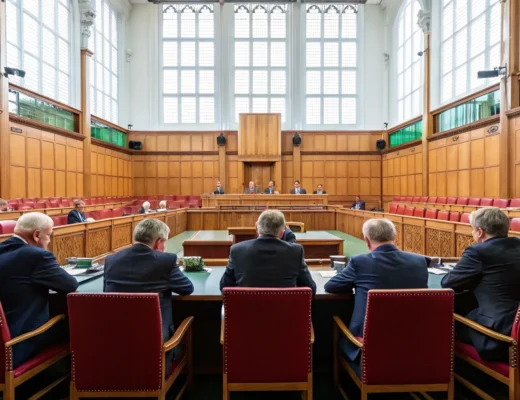The United Nations Security Council recently approved an international security operation to support Haiti in its fight against Haitian gang violence. The Haitian government asked for help, and Foreign Minister Jean Victor Geneus thanked the council, calling it “a sign of solidarity with a distressed population.”
The resolution, proposed by the US and Ecuador, was backed by 13 of the 15 council members, though China and Russia decided not to participate. This decisive action taken by the United Nations aims to stabilize the situation in Haiti and protect the citizenry from the escalating violence caused by powerful gangs. As the international security force is deployed, Haiti is hopeful that this crucial support will lead to the eventual dismantling of these criminal organizations, restoring peace and stability in the region.
Multinational Security Support Mission and Arms Embargo
The Multinational Security Support Mission is authorized to “undertake all necessary actions” in aiding Haiti with the ongoing crisis. Additionally, the UN has put into effect an arms embargo against all gangs since most of the weapons they use are from the US. Prior to this, the embargo only applied to specific individuals. This broader implementation of the arms embargo aims to curb the influx of weapons and reduce violence perpetrated by these criminal groups. The Multinational Security Support Mission and the UN are working closely together in order to stabilize the crisis-stricken nation and ensure the safety of its citizens.
International Participation and Support
Kenya has offered to spearhead the security assistance mission and has pledged to dispatch 1,000 police officers to Haiti. The Bahamas has also committed 150 personnel, with Jamaica and Antigua and Barbuda expressing their support as well. Kenyan Foreign Affairs Minister Alfred Mutua anticipates the officers’ arrival in Haiti by January 2023. In addition to the police force, various countries participating in the mission will provide logistical support, supplies, and financial assistance to the beleaguered nation. This international effort aims to bolster Haiti’s security infrastructure and improve the overall safety of its citizens amid various challenges facing the country.
US Support for the Mission
While the US has not sent troops, it has provided logistical and financial assistance to the multinational mission, including intelligence, transportation, communication, and medical support. US Ambassador to the UN, Linda Thomas-Greenfield, highlights that this is “just the initial step” and emphasizes the need for ongoing efforts to deploy the mission. Furthermore, she stressed the importance of international cooperation and collaboration in ensuring the mission’s success and addressing the root causes of conflict in the region. As the situation continues to develop, the US and other participating nations remain committed to supporting and enhancing the efforts of the multinational force to bring stability and security to the affected areas.
Electoral Processes and Political Stability
Amid the instability in Haiti under unelected Prime Minister Ariel Henry, the Security Council encourages the nation to strive for “open, inclusive, and credible electoral processes and fair and free elections.” Haiti has lacked elected representatives since January 2021. This ongoing political void has significantly affected the Haitian government’s ability to address pressing issues such as widespread poverty, lack of access to basic services, and the country’s overall security. The Security Council’s call for fair elections highlights the urgency to establish a representative democratic system in order to promote stability and socio-economic development in the nation.
Concerns from Previous UN Interventions
Haitians remain wary of the UN’s presence, recalling prior peacekeeping deployments in 2004, 2010, and 2017. These previous missions have been tarnished by reports of sexual exploitation, abuse, and even the introduction of cholera in 2010, which led to the deaths of thousands of Haitians. As a result, the Haitian people are concerned about the potential negative impacts of new UN interventions, and are cautious about welcoming any additional peacekeeping forces.
Environmental Regulations and Health Protection
The current resolution demands countries participating in the security mission to enforce environmental regulations to avoid water-related diseases such as cholera, introduced by UN peacekeepers in 2010. This initiative aims to ensure that future peacekeeping missions take responsibility for protecting local environments and safeguarding the health of both residents and mission personnel. By focusing on strict adherence to environmental standards, the resolution seeks to prevent the recurrence of incidents like the cholera outbreak and promote sustainable practices within peacekeeping operations.
Frequently Asked Questions (FAQ)
What is the purpose of the international security operation in Haiti?
The purpose of the international security operation is to support Haiti in its fight against violent gangs, stabilize the situation, and protect citizens from the escalating violence caused by these criminal organizations.
What is the Multinational Security Support Mission?
The Multinational Security Support Mission is a UN-authorized mission that aims to “undertake all necessary actions” to aid Haiti with the ongoing crisis caused by violent gangs.
Which countries are participating in the mission?
Some of the participating countries include Kenya, the Bahamas, Jamaica, and Antigua and Barbuda. These countries have committed to sending security personnel and providing logistical support, supplies, and financial assistance.
What is the role of the US in this mission?
The US is providing logistical and financial assistance to the multinational mission, including intelligence, transportation, communication, and medical support, but has not sent troops.
What is the UN Security Council’s stance on elections in Haiti?
The UN Security Council encourages Haiti to strive for “open, inclusive, and credible electoral processes and fair and free elections” to establish a representative democratic system and promote stability and socio-economic development.
Why are Haitians concerned about previous UN interventions?
Haitians are concerned because previous UN peacekeeping missions have been associated with sexual exploitation, abuse, and the introduction of cholera, which led to the deaths of thousands of Haitians. These negative impacts make them wary of welcoming additional peacekeeping forces.
What steps are being taken to protect the environment and health of Haitians during this mission?
The current resolution demands countries participating in the security mission to enforce environmental regulations to avoid water-related diseases such as cholera and promote sustainable practices within peacekeeping operations.
First Reported on: reuters.com
Featured Image Credit: Photo by ArtHouse Studio; Pexels; Thank you!







